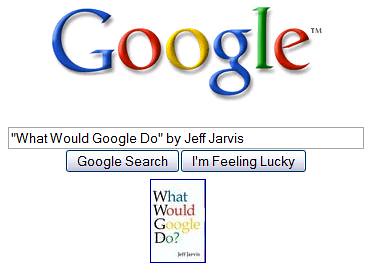It’s difficult to remember the Internet before Google. In just over ten years, the little company begun in a Menlo Park, California garage has grown into a globally-known giant. Its name has become a common verb. Its search engine is the world’s primary link to exploring the Web. Some of its freely-shared tools have replaced resources that seemed indispensable a short time ago, and its other applications may be destined to do the same: Google Maps, Google Earth, Google documents, Chrome, G-Mail, Google Scholar, Picasa, and on and on. Google tools are certainly part of my daily life.
 What made Google an unrivaled success in such a short time? How can other companies survive in a Google world? Media writer and blogger Jeff Jarvis thinks the best way to adapt to this tumultuous new world is to emulate the giant. In whichever industry, business, or organization you might be involved, Jarvis suggests you ask yourself the same question: “What would Google do? How might Google founders Larry Page and Sergey Brin approach your circumstance?
What made Google an unrivaled success in such a short time? How can other companies survive in a Google world? Media writer and blogger Jeff Jarvis thinks the best way to adapt to this tumultuous new world is to emulate the giant. In whichever industry, business, or organization you might be involved, Jarvis suggests you ask yourself the same question: “What would Google do? How might Google founders Larry Page and Sergey Brin approach your circumstance?
In What Would Google Do? [LibraryThing / WorldCat], Jarvis presents his case in two parts. In the first half of the book, he describes the Google model as a means of explaining its success. Google seeks simplicity and effective results. It gives its products away, knowing well-used tools will keep people coming back for more. In many ways, Google offers itself as a platform for other people’s creativity, realizing that people prefer controlling, manipulating, and tweaking the tools they use. Its corporate culture has been cited as a model for nurturing ideas, research (backed up by arguably the best data crunching on earth), and deployment. Even Google’s contradictions (e.g., a corporate giant with a start-up’s metality, tight-lipped projects with a freeware face) add to its success. [Short mention is given to Google’s selective censorship in some countries despite it’s claimed support for freedom of information, too.]
With the Google approach described in the first half, Jarvis runs down a checklist of specific industries in the second half. He applies the Google philosophy to each. It’s harsh at times, but the approach seems appropriate in the competitive business world. I found it intriguing, for example, each time he urged companies to step back and ask themselves what business they are in. Take newspapers. Are they in business to sell newspapers? Seems obvious, right? Are they stuck with newspaper or might they be in business to sell news — regardless the medium? Perhaps they do best selling advertisements? How can they best supply an audience to their advertisers? Another example: airlines. Do airlines fly airplanes … or move people? Companies should take a hard look at their defining product focus its resources there. If serving people is crucial to its bottom line, then it jolly well better offer quality customer service.
Jarvis also suggested being open to change and, if necessary, radical change. If a company’s future lies in completely ripping apart and restructuring its product, it must do so. Hesitation could doom the company. Why? Because if there’s a better way to do something, someone will eventually do it. Better you than a competitor, don’t you think?
Jarvis gets wobbly with some of the industries. He’s not equally familiar with all of them, but nevertheless tries to apply Google principles with mixed results.
The tumultuous changes he predicts/advocates was making me a bit wobbly by the end of the book, in fact. Every revolution he discussed could be imagined at the ground level as uprooted careers and job displacements for many people. Millions of them. I’m not saying Jarvis is wrong. He may be quite right. I just hope the ride into the Googlification of all business isn’t as devastating to as many people as it seems. This was a provocative book.

